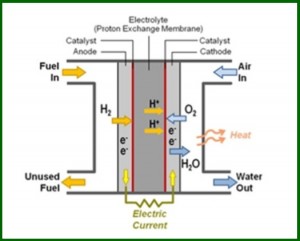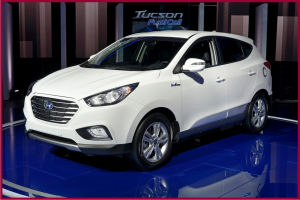
The benefits of hydrogen are well known. Supplies for the U.S. can be produced here. Since it can come from renewable sources, as well as water and natural gas, its quantity is virtually unlimited.
While many automakers are hedging their alternative powertrain bets, Hyundai says it will offer its next-generation Tucson Fuel Cell vehicle for the U.S. market for just $499 per month, including unlimited free hydrogen refueling and valet maintenance at no extra cost. For the first time, retail consumers will be able to put a semi-mass-produced, federally certified hydrogen fuel cell vehicle in their driveways, with availability beginning in spring 2014 at a few Southern California Hyundai dealers.
The move – part image enhancing green marketing and part technology preview of a large bet Hyundai is placing will put pressure on other automakers to respond. Honda and Toyota have also announced plans to sell a limited number of fuel cell sedans in the Los Angeles area by 2015, dependent on a government project to build an expensive hydrogen-refueling network. This begs the question – where are Chrysler, Ford and GM on deploying this potentially breakthrough technology? Are they once again missing the next efficiency breakthrough? California approved a plan in October 2013 to develop up to 100 hydrogen-refueling stations in the state over the next several years. (Japanese, South Korean Automakers to offer Fuel Cell EVs by 2015)

Hyundai is also working Enterprise Rent-A-Car to make the Tucson Fuel Cell available at some locations in the Los Angeles and Orange Counties.
The Korean company is moving slightly ahead of that schedule, taking a lesson from the Toyota Prius hybrid success, whose earlier mass production led to market dominance in hybrids that Toyota and Lexus still profit from today in terms of sales and a green image. Hyundai and companion brand Kia suffered an image hurting indignity when the Korean company got caught cheating on EPA fuel economy ratings. The fuel cell program will allow it to repair some of that damage.
Hyundai of course heavily advertises and promotes fuel economy as the very cornerstone of the brand. Moreover, Hyundai has knocked and mocked other automakers for having an asterisk in their advertising since only some their models achieved the best mileage in the ad. Hyundai, in effect, should have been running ads with the world’s largest mileage discloser asterisk*. (See Hyundai and Kia Caught in EPA Mileage Rating Fraud, Hyundai Cancels Media Event in Wake of EPA MPG Fraud)
The Hyundai Tucson Fuel Cell will initially be offered to customers in the Los Angeles and the Orange County region for $499 per month for a 36-month term, with $2,999 down. This include unlimited free hydrogen refueling.
“When we spoke to customers interested in driving a hydrogen fuel cell vehicle, many wondered what the cost of hydrogen would be,” said John Krafcik, CEO Hyundai Motor America. “To ease those concerns as we build-out the hydrogen refueling network, we thought covering this cost for these early adopters in the monthly payment was the best approach, and consistent with other aspects of our Hyundai Assurance program.
In addition, Tucson Fuel Cell owners will have the same services of the Hyundai Equus “At Your Service” valet program. If a Tucson Fuel Cell requires any service, a Hyundai dealer will pick up the vehicle and provide a loaner, then return their car after service to their home or business, at no charge.
The Tucson Fuel Cell begins mass production for the U.S. market in February 2014 at the Ulsan, Korea assembly plant that also manufactures the Tucson gasoline-powered crossover. Now all that remains to be seen are whether customers appear in any meaningful numbers.

